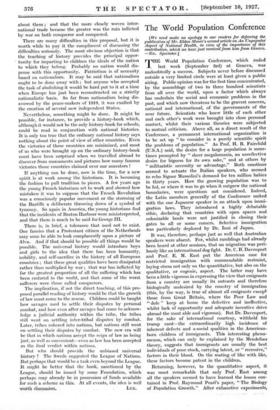The War-like Spirit and the Teaching of History
AN officer who has had a very distinguished career in one of the fighting Services has asked me to enlist the sympathy of readers of the Spectator for a project which he thinks might reduce the combative spirit that 'keeps nations in the expectation of wars, if not on the 'edge of them. ŌĆó ŌĆó ŌĆó He tells me that recently he was travelling from Germany to London with an intelligent Swede, and ŌĆó during the journey they discussed the apparent inevit- ability of war. The Swede, speaking as a member of a small nation which might hope normally to remain outside 'most European quarrels, deplored, nevertheless, the ŌĆó hardships' inflicted on the lesser peoples when the Great 'Powers go to war.' He resented the fact that his country was the plaYthing of forces which the weaker States Could do nothing whatever to control. Then he burst out with the declaration that wars were not inevitable at all. They were almost wholly caused, and usually. prolonged, he said, by the false manner in which history is taught to children. Children are brought up to regard people of other nations as enemies who will fasten a quarrel on their neighbours if they can, and to believe that when disputes arise the most glorious way of settling them is still to pour out human life and money till one side .or the other is humbled or exhausted.
My friend asked the Swede what remedy he suggested, and the answer was that an impartial universal history ought to be written, and used as a text-book in the schools of all civilized nations. He thought that if this were done children would- grow. up in the 'understanding that wars had always been disastrous except for the glorification of individuals ; that there was nothing grand or' ennobling about them ; and that the more closely woven inter- national trade became the greater was the ruin inflicted by war on both conqueror and conquered.
There are many difficulties in this proposal, but it is worth while to pay it the compliment of discussing the difficulties seriously. The most obvious objection is that the teaching of history provides the principal oppor- tunity for imparting to children the ideals of the nation to which they belong. Probably no nation would dis- pense with this opportunity. Patriotism is of necessity based on nationalism. It may be said that nationalism ought to be done away with ; but anyone who accepted the task of abolishing. it would be hard put to it at a time when Europe has just been reconstructed on a strictly nationalistic basis. So far from nationalism being dis- avowed by the peace-makers of 1919, it was exalted by the creation of several new independent States.
Nevertheless, something might be done. It might be possible, for instance, to provide a history-book which, although it would not be the only history-book for schools, could be read in conjunction with national histories. It is only too true that the ordinary national history says nothing about the point of view of other countries. Even the victories of those countries are minimized, and most of us who were brought up on the ordinary history-book must have been surprised when we travelled abroad to discover from monuments and pictures how many famous victories those countries claimed over our ancestors !
If anything can be done, now is the time, for a new spirit is at work among the historians. It is becoming the fashion to pull tradition to pieces. A few years ago the young French historians set to work and showed how mistaken it was to suppose that the French Revolution was a consciously popular movement or the storming of the Bastille a deliberate throwing down of a symbol of tyranny. So again in America, the young historians find that the incidents of Boston Harbour were misinterpreted, and that there is much to be said for George III.
There is, in brief, a tolerance that used not to exist. One fancies that a Protestant citizen of the Netherlands may soon be able to look complacently upon a picture of Alva. And if that should be possible all things would be possible. The universal. history would introduce boys and girls to the idea that there has been humanity, nobility, and self-sacrifice in the history of all European countries ; that these great qualities have been dissipated rather than multiplied by war ; that war has inflicted by far the greatest proportion of all the suffering which has been endured in the world, and that some of the worst sufferers were those called conquerors.
The implication, if not the direct teaching, of this pro- posed parallel reading of history would be that the growth of law must come to the rescue. Children could be taught how savages used to settle their disputes by personal combat, and how even after savages had come to acknow- ledge a judicial authority within the tribe, the tribes still went. on settling inter-tribal disputes by combat. Later, tribes cohered into nations, but nations still went on settling their disputes by combat. The new era will be that in which nations accept the reign of law as being just, as well as convenientŌĆöeven as law has been accepted as the final verdict within nations.
But who should provide ŌĆó the unbiased universal history ? The Swede suggested the League of Nations. But perhaps that would be a task even beyond the League. It might be better that the book, sanctioned by the League, should be issued by some Foundation, which perhaps may already be in possession of funds available for such a scheme as this. At all events, the idea is well







































 Previous page
Previous page